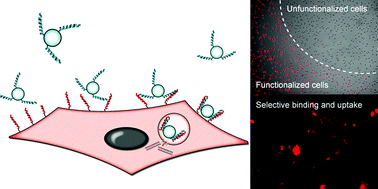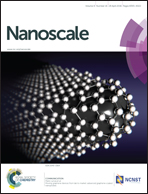Coiled coil interactions for the targeting of liposomes for nucleic acid delivery†
Abstract
Coiled coil interactions are strong protein–protein interactions that are involved in many biological processes, including intracellular trafficking and membrane fusion. A synthetic heterodimeric coiled-coil forming peptide pair, known as E3 (EIAALEK)3 and K3 (KIAALKE)3 was used to functionalize liposomes encapsulating a splice correcting oligonucleotide or siRNA. These peptide-functionalized vesicles are highly stable in solution but start to cluster when vesicles modified with complementary peptides are mixed together, demonstrating that the peptides quickly coil and crosslink the vesicles. When one of the peptides was anchored to the cell membrane using a hydrophobic cholesterol anchor, vesicles functionalized with the complementary peptide could be docked to these cells, whereas non-functionalized cells did not show any vesicle tethering. Although the anchored peptides do not have a downstream signaling pathway, microscopy pictures revealed that after four hours, the majority of the docked vesicles were internalized by endocytosis. Finally, for the first time, it was shown that the coiled coil assembly at the interface between the vesicles and the cell membrane induces active uptake and leads to cytosolic delivery of the nucleic acid cargo. Both the siRNA and the splice correcting oligonucleotide were functionally delivered, resulting respectively in the silencing or recovery of luciferase expression in the appropriate cell lines. These results demonstrate that the docking to the cell by coiled coil interaction can induce active uptake and achieve the successful intracellular delivery of otherwise membrane impermeable nucleic acids in a highly specific manner.



 Please wait while we load your content...
Please wait while we load your content...